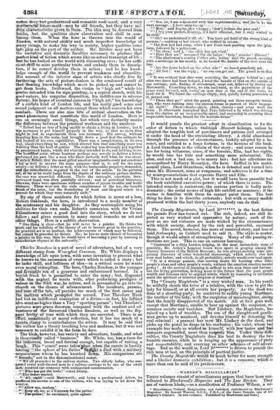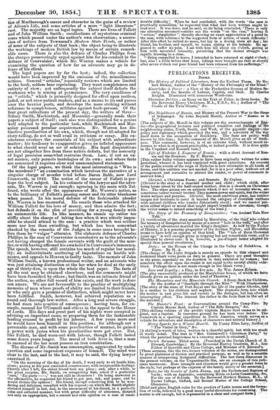WARREN'S - MISCELLANIES.* THESE volumes consist of miscellaneous papers that have
been con- tributed to Blachwoodls Magazine and The Zaw 1-leview. They are of various kinds,—as a recollection of Professor Wilson, a no.
e Miscellanies, triileal, Imaginative, and Juridical, contributed to Blackwood's Magazine: 13y Samuel Warren, D.C.L., P.U.S., of the Innen Temple, one of her Mejesty's Courted. In two volumes. Published by Blackwood and Sons.: tice of Marlborough's career and character in the guise of a review of Alison's Life, and some articles of a more " light literature" cast. The majority are on legal topics. There are lives of Follett and of John William Smith ; recollections of mysterious criminal cases which passed under the author's own observation; a succes- sion of notices from Townsend's Modern State Trials, or rather of some of the subjects of that book ; the object being to illustrate the workings of modern British law by means of certain remark- able eases. There is also the defence of Charles Phillips from the charges perseveringly urged against him for his conduct in the defence of Courvoisier; which Mr. Warren makes a vehicle for examining the question of how far an advocate may go in de- fence of his client.
The legal papers are by far the best ; indeed, the collection would have been improved by the omission of the miscellaneous notices. General "articles," especially reviews which are limited to the book, seldom bear reprinting. They want completeness and entirety of view ; not unfrequently the. subject itself defeats the Workman who is aiming at permanence. The very excellence of an "article," which is primarily designed for effect upon restless, jaded, or not over-patient readers, and as a means to its end passes over the heavier parts, and develops the more striking without reference to completeness' militates against book-perusal. Of the four great collections of the present day, the writers of three— Sidney Smith, Mackintosh, and Macaulay--generally made their papers a subject of itself; each also was distinguished for a genius well adapted to the particular task, while Mackintosh and Mac- aulay possessed peculiar acquirements. Mr. Warren has dis- tinctive peculiarities of his own, which, though-not ill-adapted for story-telling, do not so well avail in criticism or essay. His ex- uberance overlays the essentials of his subject with subordinate matter ; his tendency to exaggeration gives an inflated appearance to what should wear an air of sobriety. His legal disquisitions are ,not altogether free from these native defects, but the necessity of legal precision somewhat restrains them. Law, if not an ex- act science, only permits tautologies of its own ; and where facts are concerned it requires clear an unencumbered statement.
Of the legal papers, we think the most interesting is "Who is the murderer?" an examination which involves the narrative of a singular charge of murder tried before Baron Rolfe, now Lord Cranworth, in 1842. The notice of the career of Follett is per- _haps the best subject. Is his estimate of the lawyer and the advo- cate, Mr. Warren -is just enough; agreeing in the main with Tal- loan', who wrote after the appearance of Mr. Warren's notice as to the brilliancy of Follett's passing career and its utter blankness -when passed. In his moral defence of the fashionable pleader Mr. Warren is less successful. He assails those who attacked Sir William Follett for his love of money, and then admits the fact ; but defends it on the plea of providing for a young family with al nninseauble life. In like manner, he stands up rather too stiffly about the charge of taking fees when, it was utterly impos- sible he should attend to the case: a practice which was neither more nor less than swindling, • but which has been somewhat clacelted by the remarks of the Judges in some cases brought be- fore them by-" vulgar" attornies. The elaborate defence of Charles Phillips in the ease of Courvoisier is conclusive as to the advocate's not having charged the female servants with the guilt of the mur- der, or with having affirmed his own belief in Courvoisier's innocence. The speech, however, still contains too much of regular bar moral- ity; an indiscriminate scattering of imputations on hostile wit- nesses, and appeals to Heaven in faulty taste. The memoir of John William Smith, a known professional writer, and an advocate who was just attaining distinction at the bar when he died at the early age of thirty-five' is upon the whole the best paper. The facts of all the rest may be obtained elsewhere, and the comments might have been furnished by others ; but Smith was an intimate friend of the author,, no other full record of him exists, and the work is done eau amore. We are not favourable to the practice of multiplying memoirs of men whose proofs of ability are limited to their friends, or who only gave a promise of distinction, which might never have been fulfilled. Smith, however, had achieved reputation as a sound and thorough law-writer. After a long and severe struggle, he had risen into practice of consequence ; having been, for ,ex- ample, counsel for O'Connell and others in the appeal to the House of Lords. His days and great part of his nights were occupied in advising on important eases, or preparing them for the fashionable leading counsel to profit by his labours. A few years more and he would have been himself in this position ; for although not a personable man, and with some peculiarities of manner, he gained a power with juries when his peculiarities were got over. But, like Follett, he died worn-out with labour, though Follett lasted some dozen years longer. The moral of both lives is, that a man to succeed at the bar must possess an iron constitution.
The disease of Mr. Smith was consumption, aggravated by undue exertion and some imprudent exposure of himself. The mind was clear to the last, and to the last, it may be said, the dying lawyer exercised it.
"On the morning of the day of his death, I went early to it beside him, alone ; gazing at his poor emaciated countenance with inexpressible feelings.
"Shortly after I left, his oldest friend took my place ; and, after a while, to his great surprise, Mr. Smith, on recognizing him asked if a particular case,' :Kr-parts —,' was net still in chambers ? 'On being answered in the affirmative, lm requested his friend to get pen, ink, and paper, and he would dictate, the opinion! His friend, though conceiving him to be wan- dering and delirious, Complied with his request ; on which Mr.Stnith slightly elevated himself in bed, and, to the amazement of his friend, in a pertectly calm and collected manner, but with great difficulty of utterance, dictated not only an appropriate, but a correct arid able opinion on a case of coma-
derable difficulty ! When he bad concluded, with the words 'the case is practically remediless,' he requested that what had been written might be read over. It was done, and he said, on its being concluded, Thine is only one alteration necessary—strike out the words "on the case," leaving it "action," simpliciter ' ; thereby showing an exact appreciation of a point in the case with reference to the suggested form of action, of ranch difficulty l After this effort he rallied no more, but lay in a dozing state all dq >: his friend, his brother, and myself, by turns, sitting at his bedside. is ap- peared to suffer no pain. I sat with him till about six o'clock, gazing at him with mournful intensity, perceiving that the dismal struggle was rapidly drawing to a close. " hieing compelled to leave' I intended to have returned at eight o'clock; but, alas ! a little before that hour, tidings were brought me that at ghostly after seven o'clock our poor friend had been released from bissufferiams."



























 Previous page
Previous page